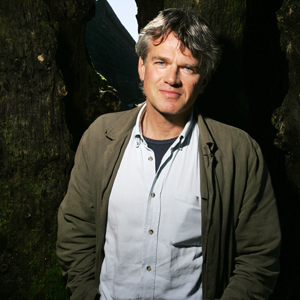
Régine Deforges was a French author, editor, director, and playwright. Her book La Bicyclette bleue was the most popular book in France in 2000 and it was known by some to be offensive and to others for its plagiarism, neither of which was proved.

Alexandra David-Néel was a Belgian–French explorer, spiritualist, Buddhist, anarchist, opera singer, and writer. She is most known for her 1924 visit to Lhasa, Tibet, when it was forbidden to foreigners. David-Néel wrote over 30 books about Eastern religion, philosophy, and her travels, including Magic and Mystery in Tibet, which was published in 1929. Her teachings influenced the beat writers Jack Kerouac and Allen Ginsberg, the popularisers of Eastern philosophy Alan Watts and Ram Dass, and the esotericist Benjamin Creme.

The genre of travel literature or travelogue encompasses outdoor literature, guide books, nature writing, and travel memoirs.

Christine Angot is a French novelist, playwright and screenwriter.

Nicolas Bouvier was a 20th-century Swiss traveller, writer, picture editor and photographer. He studied in Geneva in the 1950s and lived there later between his travels.

Chantal Chawaf is a French writer.

Catherine Clément is a French philosopher, novelist, feminist, and literary critic, born in Boulogne-Billancourt. She received a degree in philosophy from the École Normale Supérieure, and studied under its faculty Claude Lévi-Strauss and Jacques Lacan, working in the fields of anthropology and psychoanalysis. A member of the school of French feminism and écriture féminine, she has published books with Hélène Cixous and Julia Kristeva.
Jeannette Batti (1921–2011) was a French film actress.

Olivier Weber is a French writer, novelist and reporter at large, known primarily for his coverage of the wars in Iraq and Afghanistan. He has been a war correspondent for twenty-five years, especially in Central Asia, Africa, Middle-East and Iraq. He is an assistant professor at the Institut d'études politiques de Paris, president of the Prize Joseph Kessel and today ambassador of France at large. Weber has won several national and international awards of literature and journalism, in particular for his stories on Afghanistan and for his books on wars. His novels, travels writing books and essays have been translated in a dozen of languages.

En attendant les hommes is a 2007 documentary film by Katy Léna N'diaye about women muralists in Oualata, Mauritania. In this town on the far edge of the Sahara desert, three women practice traditional painting on the walls of the town.

Elisa Longo Borghini is an Italian professional road cyclist, who rides for UCI Women's WorldTeam Lidl–Trek.
The Grand Prix du Morbihan Féminin is an elite women's professional one-day road bicycle race held in France and is currently rated by the UCI as a 1.1 race.

Cecilie Uttrup Ludwig is a Danish professional road cyclist, who currently rides for UCI Women's WorldTeam FDJ–Suez.

Malene Rydahl is a former executive in corporate communication and currently a writer, speaker and executive coach specializing in happiness, well-being and management.
The Prix Renée Vivien is an annual French literary prize which is awarded to poets who write in French. Dedicated to the British poet Renée Vivien, the eponymous prize was first initiated in 1935, and continued intermittently by three different patrons, each with their own vision. First patron was Hélène de Zuylen de Nyevelt de Haar, followed by Natalie Clifford Barney in 1949 then more latterly and currently ongoing from 1994 with Claude Evrard. From each patron, the naming of the award after Renée Vivien was an act of remembrance. Nonetheless, women's poetry, feminist literature and the memories of romantic entanglement with the honoured poet have been inspiring on the first two patrons, who were more alike in their approach to awarding poets, while the heritage of Renée Vivien's style in contemporary poetry interested more Claude Evrard.
Margot Lambert is a French badminton player. She started playing badminton at the age of 8 in Tahiti, and now affiliates with Club de l'Hermitage et du Tournonais. She was part of the national team that won the gold medal at the 2017 European Junior Championships. Lambert was the women's doubles National Champions in 2020.
Moravagine is a 1926 novel by Blaise Cendrars, originally published by Grasset. It is a complex opus with a central figure, the eponymous Moravagine, like a dark persona of the author which he gets rid of through writing. Its genesis took a decade and Cendrars never stopped working on it. In 1956, the author somewhat rewrote the text, added a postface and a section titled "Pro domo: How I wrote Moravagine". In its ultimate revision, Cendrars says the book is definitely incomplete, as it was meant to be a preface to a "complete works of Moravagine" that are not there.

Alexia Guggémos, is a French art critic, curator, writer and digital sociologist. The Art Gorgeous Magazine ranked her in the top 20 most influential women of the French art scene (2019).
Sophie de Renneville or Madame de Renneville, was the pen name of Sophie de Senneterre, who was born in Senneterre, Caen, France in 1772 and died in Paris in 1822 at 50. She was a writer, editor and journalist.
Gabrielle Poulin was a Canadian writer. One of the most prominent writers in Franco-Ontarian literature, she was most noted for her 1994 novel Le Livre de déraison, which won the Grand Prix du Salon du livre de Toronto in 1994.












